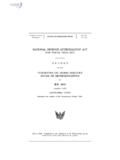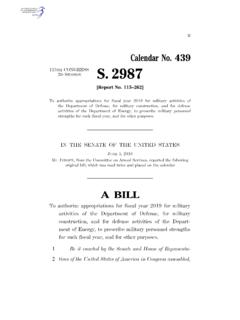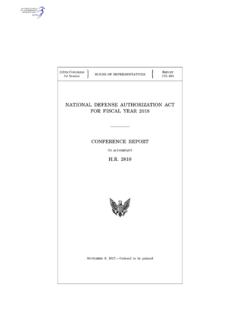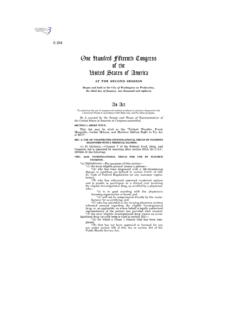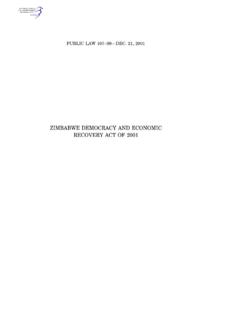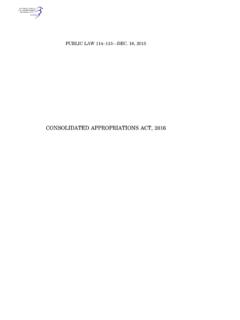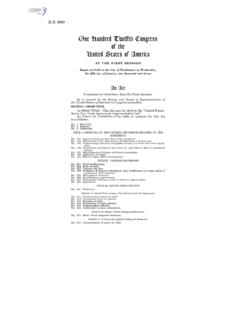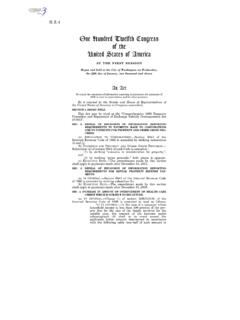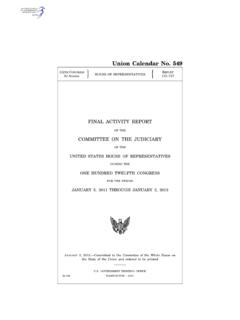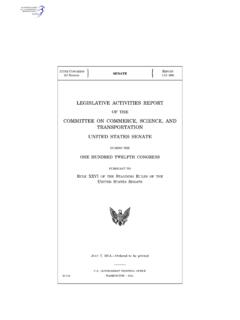Transcription of One Hundred Fourteenth Congress of the United States of ...
1 S. 1890 One Hundred Fourteenth Congress of the United States of America AT THE SECOND SESSION Begun and held at the City of Washington on Monday, the fourth day of January, two thousand and sixteen An Act To amend chapter 90 of title 18, United States Code, to provide Federal jurisdiction for the theft of trade secrets , and for other purposes. Be it enacted by the Senate and House of Representatives of the United States of America in Congress assembled, SECTION 1. SHORT TITLE. This Act may be cited as the defend trade secrets Act of 2016 . SEC. 2. FEDERAL JURISDICTION FOR THEFT OF trade secrets . (a) INGENERAL. Section 1836 of title 18, United States Code, is amended by striking subsection (b) and inserting the following: (b) PRIVATECIVILACTIONS.
2 (1) IN GENERAL. An owner of a trade secret that is mis-appropriated may bring a civil action under this subsection if the trade secret is related to a product or service used in, or intended for use in, interstate or foreign commerce. (2) CIVIL SEIZURE. (A) IN GENERAL. (i) APPLICATION. Based on an affidavit or verified complaint satisfying the requirements of this para-graph, the court may, upon ex parte application but only in extraordinary circumstances, issue an order providing for the seizure of property necessary to pre-vent the propagation or dissemination of the trade secret that is the subject of the action.
3 (ii) REQUIREMENTSFORISSUINGORDER. The court may not grant an application under clause (i) unless the court finds that it clearly appears from specific facts that (I) an order issued pursuant to Rule 65 of the Federal Rules of Civil Procedure or another form of equitable relief would be inadequate to achieve the purpose of this paragraph because the party to which the order would be issued would evade, avoid, or otherwise not comply with such an order; (II) an immediate and irreparable injury will occur if such seizure is not ordered; (III) the harm to the applicant of denying the application outweighs the harm to the legiti-mate interests of the person against whom seizure would be ordered of granting the application and S.
4 1890 2 substantially outweighs the harm to any third par-ties who may be harmed by such seizure; (IV) the applicant is likely to succeed in showing that (aa) the information is a trade secret; and (bb) the person against whom seizure would be ordered (AA) misappropriated the trade secret of the applicant by improper means; or (BB) conspired to use improper means to misappropriate the trade secret of the applicant; (V) the person against whom seizure would be ordered has actual possession of (aa) the trade secret; and (bb) any property to be seized; (VI) the application describes with reasonable particularity the matter to be seized and, to the extent reasonable under the circumstances, identi-fies the location where the matter is to be seized; (VII) the person against whom seizure would be ordered, or persons acting in concert with such person, would destroy, move, hide, or otherwise make such matter inaccessible to the court, if the applicant were to proceed on notice to such person; and (VIII) the applicant has not publicized the requested seizure.
5 (B) ELEMENTS OF ORDER. If an order is issued under subparagraph (A), it shall (i) set forth findings of fact and conclusions of law required for the order; (ii) provide for the narrowest seizure of property necessary to achieve the purpose of this paragraph and direct that the seizure be conducted in a manner that minimizes any interruption of the business oper-ations of third parties and, to the extent possible, does not interrupt the legitimate business operations of the person accused of misappropriating the trade secret; (iii)(I) be accompanied by an order protecting the seized property from disclosure by prohibiting access by the applicant or the person against whom the order is directed, and prohibiting any copies, in whole or in part, of the seized property, to prevent undue dam-age to the party against whom the order has issued or others, until such parties have an opportunity to be heard in court; and (II) provide that if access is granted by the court to the applicant or the person against whom the order is directed, the access shall be consistent with subpara-graph (D).
6 (iv) provide guidance to the law enforcement offi-cials executing the seizure that clearly delineates the scope of the authority of the officials, including S. 1890 3 (I) the hours during which the seizure may be executed; and (II) whether force may be used to access locked areas; (v) set a date for a hearing described in subpara-graph (F) at the earliest possible time, and not later than 7 days after the order has issued, unless the party against whom the order is directed and others harmed by the order consent to another date for the hearing, except that a party against whom the order has issued or any person harmed by the order may move the court at any time to dissolve or modify the order after giving notice to the applicant who obtained the order.
7 And (vi) require the person obtaining the order to pro-vide the security determined adequate by the court for the payment of the damages that any person may be entitled to recover as a result of a wrongful or excessive seizure or wrongful or excessive attempted seizure under this paragraph. (C) PROTECTION FROM PUBLICITY. The court shall take appropriate action to protect the person against whom an order under this paragraph is directed from publicity, by or at the behest of the person obtaining the order, about such order and any seizure under such order. (D) MATERIALS IN CUSTODY OF COURT. (i) IN GENERAL.
8 Any materials seized under this paragraph shall be taken into the custody of the court. The court shall secure the seized material from phys-ical and electronic access during the seizure and while in the custody of the court. (ii) STORAGE MEDIUM. If the seized material includes a storage medium, or if the seized material is stored on a storage medium, the court shall prohibit the medium from being connected to a network or the Internet without the consent of both parties, until the hearing required under subparagraph (B)(v) and described in subparagraph (F). (iii) PROTECTION OF CONFIDENTIALITY.
9 The court shall take appropriate measures to protect the con-fidentiality of seized materials that are unrelated to the trade secret information ordered seized pursuant to this paragraph unless the person against whom the order is entered consents to disclosure of the mate-rial. (iv) APPOINTMENT OF SPECIAL MASTER. The court may appoint a special master to locate and isolate all misappropriated trade secret information and to facilitate the return of unrelated property and data to the person from whom the property was seized. The special master appointed by the court shall agree to be bound by a non-disclosure agreement approved by the court.
10 (E) SERVICE OF ORDER. The court shall order that service of a copy of the order under this paragraph, and the submissions of the applicant to obtain the order, shall be made by a Federal law enforcement officer who, upon S. 1890 4 making service, shall carry out the seizure under the order. The court may allow State or local law enforcement officials to participate, but may not permit the applicant or any agent of the applicant to participate in the seizure. At the request of law enforcement officials, the court may allow a technical expert who is unaffiliated with the applicant and who is bound by a court-approved non-disclo-sure agreement to participate in the seizure if the court determines that the participation of the expert will aid the efficient execution of and minimize the burden of the seizure.
